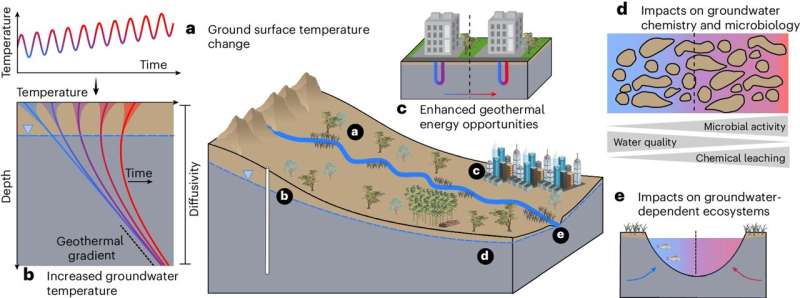This article has been reviewed according to Science X's editorial process and policies. Editors have highlighted the following attributes while ensuring the content's credibility:
fact-checked
peer-reviewed publication
trusted source
proofread
Climate change projected to warm shallow groundwater by up to 3.5°C by 2099

Shallow groundwater is projected to warm on average between 2.1°C and 3.5°C by the end of the century, according to a world-first global groundwater temperature model.
Charles Darwin University (CDU) Outstanding Future Researcher Dr. Dylan Irvine and University of Newcastle's Dr. Gabriel Rau collaborated with colleagues from Canada, Germany, and Austria to develop the model, which aims to reveal the long-term implications of on-going shallow water groundwater warming caused by climate change.
The model projects the highest warming rates will be in Central Russia, Northern China and parts of North America and the Amazon rainforest, with Australian groundwater temperatures also expected to rise. The paper is published in the journal Nature Geoscience.
Dr. Irvine from CDU's Research Institute for the Environment and Livelihoods said an increase in groundwater temperature can be a cause for concern.
"Groundwater is the water that is present beneath the Earth's surface in pore spaces in rocks and soils. It is critical for life on Earth," Dr. Irvine said.
"Groundwater temperature can influence ecosystems, aquatic processes and water quality. If groundwater temperatures increase, then unfortunately many temperature-sensitive, groundwater-dependent ecosystems may be threatened.
"A lot of focus on climate change has rightfully been to do with weather events and the availability of water, but we do need to think more broadly about the impact that climate change will have on groundwater."
Unfortunately, for Australia the model projects that, like other countries, groundwater temperatures are expected to rise.
"Our groundwater here will warm but how much depends on whether or not humans can reduce greenhouse gas emissions to help mitigate climate change," Dr. Irvine said.
"These temperature increases can impact vital processes such as groundwater chemistry and metal leaching and microbiology, which affect water quality."
"If temperatures increase then we may see significant impacts to our local aquatic animals including their spawning processes which will impact industries and communities that are reliant on these ecosystems."
Co-author and hydrogeology Lecturer from the University of Newcastle, Dr. Gabriel Rau, warned that warming groundwater temperatures could adversely impact many ecosystems that rely on groundwater.

"Rivers rely on groundwater to keep flowing during dry times. Warm waters hold less dissolved oxygen. We've seen in the Murray Darling how low oxygen in water can contribute to fish deaths," Dr. Rau said.
According to the World Health Organization, currently only 18 out of 125 countries have temperature guidelines for drinking water.
If groundwater continues to warm, it could also compromise the safety of drinking water.
"Our model estimates that by 2099, 59 to 588 million people worldwide will live in areas where groundwater exceeds the highest threshold for drinking water temperature guidelines set by any country," Dr. Rau said.
"As groundwater warms, there is increased risk of pathogen growth which impacts drinking water quality—potentially affecting the lives of many people."
"This is especially concerning in areas where access to clean drinking water is already limited, and in areas where groundwater is consumed without treatment."
Dr. Rau also explained that rising groundwater temperatures also pose an economic risk.
"Many vital industries like agriculture, manufacturing, and energy production rely on groundwater for their operations. If the groundwater they depend on becomes too warm or more contaminated, it can disrupt their activities and potentially lead to economic losses," Dr. Rau said.
To illustrate the potential change in groundwater temperatures due to climate change, the research team, led by Dr. Susanne Benz from the Karlsruhe Institute of Technology, has developed an interactive online application to show the projected temperature changes.
This Google Earth Engine app provides zoomable maps of annual mean, maximum and minimum groundwater temperatures at different depths and seasonal variability for selected years and climate scenarios, that the team hopes will facilitate further research.
More information: Susanne A. Benz et al, Global groundwater warming due to climate change, Nature Geoscience (2024). DOI: 10.1038/s41561-024-01453-x
Journal information: Nature Geoscience
Provided by Newcastle University





















